NEWS ROUNDUP
SCOTUS blows, Boeing’s long view, Longview’s solidarity…
Monday, June 30, 2014
SUPREME COURT
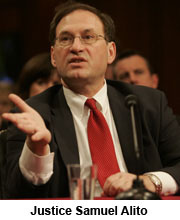 ► This morning at Politico — Harris v. Quinn ruling: Unions hit, but not fatally, by SCOTUS — The Supreme Court Monday sided with home health care workers in Illinois who want out of a union but stopped short of a sweeping decision that could have decimated union finances and membership. In Harris v. Quinn, the justices declined to reverse a precedent, set in 1977, that held states could compel public-sector employees to pay union dues. Laws mandating such payments exist in 26 states and will remain intact, in a major victory for organized labor. Justice Samuel Alito, writing for a 5-4 majority, called the precedent “questionable,” signaling an openness to revisit it in future cases.
► This morning at Politico — Harris v. Quinn ruling: Unions hit, but not fatally, by SCOTUS — The Supreme Court Monday sided with home health care workers in Illinois who want out of a union but stopped short of a sweeping decision that could have decimated union finances and membership. In Harris v. Quinn, the justices declined to reverse a precedent, set in 1977, that held states could compel public-sector employees to pay union dues. Laws mandating such payments exist in 26 states and will remain intact, in a major victory for organized labor. Justice Samuel Alito, writing for a 5-4 majority, called the precedent “questionable,” signaling an openness to revisit it in future cases.
► At ScotusBlog — Live blog of opinions — “It remains possible that in a later case the Court will overturn its prior precedent and forbid requiring public employees to contribute to union bargaining. But today it has refused to go that far. The unions have lost a tool to expand their reach. But they have dodged a major challenge to their very existence.”
ALSO see the ruling in its entirety.
► In the Washington Post — Supreme Court to weigh in on ‘freeloading’ vs. ‘right to work’ for public employees — Despite dealing with civil servants, the case should have little immediate impact on federal-employee unions.
 ► Last week from Bloomberg — President’s recess-appointment power cut by Supreme Court — The justices ruled unanimously that Obama exceeded his constitutional authority when he appointed three members of the NLRB in January 2012.
► Last week from Bloomberg — President’s recess-appointment power cut by Supreme Court — The justices ruled unanimously that Obama exceeded his constitutional authority when he appointed three members of the NLRB in January 2012.
► Last week in the Washington Post — What does the Supreme Court’s NLRB ruling mean for hundreds of labor cases? — Hundreds of National Labor Relations Board decisions were thrown into legal limbo Thursday by a Supreme Court ruling that President Obama overstepped his authority by naming three members to the panel while the Senate was on a short break.
► Last week in the Hill — Trumka: Obama ‘did the right thing’ with recess appointments — Said the AFL-CIO president:
President Obama made the recess appointments to the NLRB, because obstructionism by Republican senators was about to make the National Labor Relations Board inoperable due to a lack of NLRB members. The president did the right thing and acted on solid legal authority in making these appointments. Had he not acted, millions of workers would have been deprived of their rights under our labor laws.
► Meanwhile in Canada… in the Toronto Star — Walmart wrong to fire unionized workers, Canada’s high court says — The Supreme Court of Canada has found in favour of Quebec workers who were fired from a Walmart in Jonquiere, Que., after it shut its doors suddenly and says the former employees must be compensated. In a five-to-two decision, the country’s highest court says the retail giant modified working conditions for the employees without a valid reason when it shut down the store in 2005.
MINIMUM WAGE
► At Slog — Anyone collecting signatures on the minimum wage right now is trying to repeal it — There have been signature gatherers roaming Seattle recently and talking about our minimum wage, so let’s be totally clear, Seattle voters: If someone standing outside your Trader Joe’s this weekend wants you to sign something regarding the minimum wage, no matter what they tell you, they’re probably trying to repeal it.
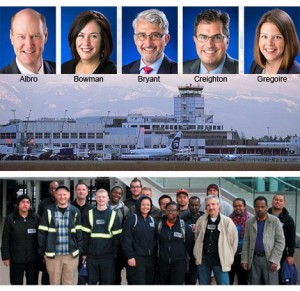 ► Last week in the Seattle Times — Sea-Tac Airport workers could get $13 an hour by 2017 — The Port of Seattle Commission introduced a proposal to raise the minimum wage to $11.22 in January and $13 in 2017 for airfield-support workers at Sea-Tac Airport. The wage increase would affect about 3,000 employees, including those who check in passengers, handle cargo and baggage, and workers such as wheelchair attendants, and those involved in catering, cleaning, maintenance, fueling, dispatching and security. Workers in dining and concessions would not be covered by the increase. A commission vote is scheduled for July 1.
► Last week in the Seattle Times — Sea-Tac Airport workers could get $13 an hour by 2017 — The Port of Seattle Commission introduced a proposal to raise the minimum wage to $11.22 in January and $13 in 2017 for airfield-support workers at Sea-Tac Airport. The wage increase would affect about 3,000 employees, including those who check in passengers, handle cargo and baggage, and workers such as wheelchair attendants, and those involved in catering, cleaning, maintenance, fueling, dispatching and security. Workers in dining and concessions would not be covered by the increase. A commission vote is scheduled for July 1.
► Last week from AP — Washington Supreme Court takes up minimum wage issue — State, federal and local law may all play a role in the Washington Supreme Court’s decision on whether a new $15 minimum wage law in SeaTac applies to airport workers, if the questions asked by justices during oral arguments Thursday are any indication.
BOEING
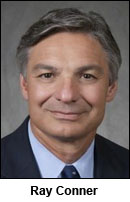 ► Last week in the Seattle Times — Ray Conner asks for understanding as Boeing cuts costs in ‘fierce marketplace’ — the Boeing Commercial Airplanes chief declares Washington state an enduring and central part of the jet-maker’s future and asked for more understanding of the company’s need to cut costs as it strives to remain competitive. He addressed the paradox that Boeing is making cuts to employee benefits and shifting some jobs to cheaper locations at a time when it is seeing record profit — $1.5 billion in the first three months of this year:
► Last week in the Seattle Times — Ray Conner asks for understanding as Boeing cuts costs in ‘fierce marketplace’ — the Boeing Commercial Airplanes chief declares Washington state an enduring and central part of the jet-maker’s future and asked for more understanding of the company’s need to cut costs as it strives to remain competitive. He addressed the paradox that Boeing is making cuts to employee benefits and shifting some jobs to cheaper locations at a time when it is seeing record profit — $1.5 billion in the first three months of this year:
I know it can be confusing to some people, because we’re doing so well at the moment … but in our industry, business cycles are long. We can’t rest on our laurels. We have to take the long view.
► Last week in the PSBJ — CEO Ray Conner’s speech riles Boeing union members — “(Boeing workers) don’t have any respect, they don’t believe the commitment,” said Rodney Evans, president of IAM 751 Local F. “They don’t believe that Boeing is committed to this region. They (Boeing) are only committed to the money.”
► Last week in the Seattle Times — 787 still having problems with unfinished work from S.C. — Last Thursday, Boeing paid out big bonuses to its South Carolina workforce for meeting an early May deadline to significantly reduce the amount of unfinished 787 work traveling to Everett. Since then, Boeing’s 787 program suffered two production incidents. One revealed continued problems with unfinished work out of South Carolina. The other seriously injured an Everett mechanic.
STATE GOVERNMENT
► In Sunday’s (Everett) Herald — State ‘constitutional crisis:’ High court vs. lawmakers — The state Supreme Court and the Legislature will face off on school funding again this fall in what some see as a test of their respective constitutional power and political will. Lawmakers are under court order to make sure the state is paying the full cost of a student’s basic education by 2018. They know it needs to be done, but there are philosophical and political differences as to how to do it. And the high court’s justices are running out of patience.
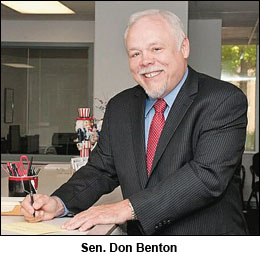 ► In the Columbian — Auditor’s Office investigates complaint over Benton, county — The Washington State Auditor’s Office has opened an investigation into Clark County and state Sen. Don Benton, who serves as the county’s director of environmental services. The complaint was filed by a resident and suggests there was lax county oversight over Benton’s dual role as a department director and state legislator. The Auditor’s Office could not provide specifics about the investigation, citing its ongoing nature.
► In the Columbian — Auditor’s Office investigates complaint over Benton, county — The Washington State Auditor’s Office has opened an investigation into Clark County and state Sen. Don Benton, who serves as the county’s director of environmental services. The complaint was filed by a resident and suggests there was lax county oversight over Benton’s dual role as a department director and state legislator. The Auditor’s Office could not provide specifics about the investigation, citing its ongoing nature.
► In the Seattle Times — In the aftermath of liquor privatization, spirits everywhere, but not cheap — Many expected liquor sales privatization to benefit businesses, the state and the public by creating a modern market that would make spirits cheap and ubiquitous. Now liquor is ubiquitous but remains expensive.
EDITOR’S NOTE — The loss of hundreds of family-wage jobs at state-run liquor stores doesn’t merit a mention in this story.
LOCAL
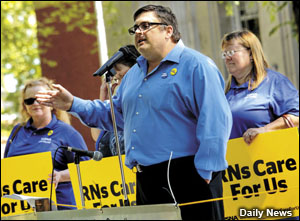 ► In the (Longview) Daily News — Union groups gather at Civic Center in solidarity as local contracts near — About 200 local union members and supporters gathered on Longview’s Civic Center facing the post office on the first day of summer for two hours of solidarity in stories and songs. The rally was put on by the Cowlitz-Wahkiakum Central Labor Council and emceed by its president, Kyle Mackey. He said the majority of Cowlitz County union members are nearing contract negotiations and wanted all unions to have each other’s backs.
► In the (Longview) Daily News — Union groups gather at Civic Center in solidarity as local contracts near — About 200 local union members and supporters gathered on Longview’s Civic Center facing the post office on the first day of summer for two hours of solidarity in stories and songs. The rally was put on by the Cowlitz-Wahkiakum Central Labor Council and emceed by its president, Kyle Mackey. He said the majority of Cowlitz County union members are nearing contract negotiations and wanted all unions to have each other’s backs.
► In today’s P.S. Business Journal — UW sanguine as medical residents’ union looms — As doctors-in-training move forward with efforts to organize, officials at UW Medicine say they’re not opposed to these medical residents forming a union — they just don’t think it’s necessary.
NATIONAL
► In the Seattle Times — The incompetence dogma (by Paul Krugman) — What’s interesting about the Affordable Care Act’s success story is that it has been accompanied at every step by cries of impending disaster. At this point, by my reckoning, the enemies of health reform are 0 for 6… A firm conviction that the government can’t do anything useful — a dogmatic belief in public-sector incompetence — is now a central part of American conservatism, and the incompetence dogma has evidently made rational analysis of policy issues impossible.
► From AP — GOP bucking business priorities on Capitol Hill — Traditional ties between the business community and the Republican Party are fraying on Capitol Hill, where the House GOP has bucked corporate interests on a series of priorities this year, from immigration to highway funding to trade.
► In today’s NY Times — Obama’s VA pick is former corporate chief — President Obama on Monday intends to nominate Robert A. McDonald, a former chief executive of Procter & Gamble, to be the next secretary of Veterans Affairs.
► In today’s NY Times — Pushback on home care (editorial) — A lawsuit against a new wage protection rule is the latest move in a misguided campaign by some states and groups representing home care agencies.
► At AFL-CIO Now — July 4 Made-in-America flags and BBQ shopping list
TODAY’S MUST-READ
 ► At Huffington Post — Bending the arc of history (by SPEEA’s Stan Sorscher) — Many economists and policy-makers struggle to explain growing inequality and the erosion of the middle class. Nobel laureate economist Paul Krugman has a simple explanation, “…corporations use their growing monopoly power to raise prices without passing the gains on to their employees.” The top 1% take 93% of all new gains created in our economy. They divide gains that way — because they can! … Let’s be clear. It is NOT the purpose of an economy to generate or justify huge fortunes. The purpose of an economy is to raise living standards. That is, to raise the standard we experience in our daily life.
► At Huffington Post — Bending the arc of history (by SPEEA’s Stan Sorscher) — Many economists and policy-makers struggle to explain growing inequality and the erosion of the middle class. Nobel laureate economist Paul Krugman has a simple explanation, “…corporations use their growing monopoly power to raise prices without passing the gains on to their employees.” The top 1% take 93% of all new gains created in our economy. They divide gains that way — because they can! … Let’s be clear. It is NOT the purpose of an economy to generate or justify huge fortunes. The purpose of an economy is to raise living standards. That is, to raise the standard we experience in our daily life.
The Stand posts links to Washington state and national news of interest every weekday morning by 10 a.m.





